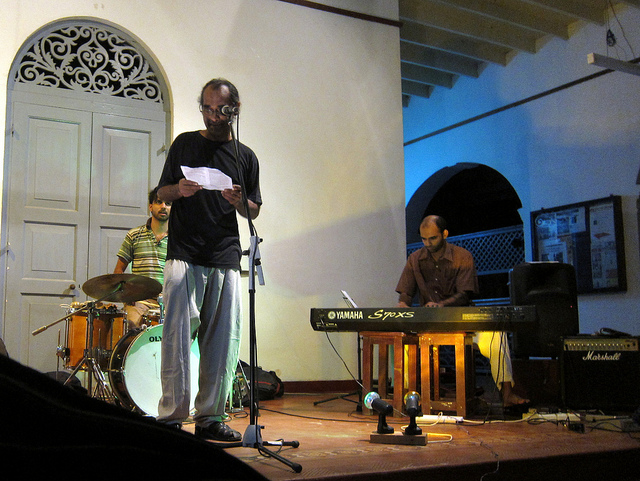Poetry is one of the oldest literary art forms. The earliest types of poems were often sung or recited to pass on oral histories, law and ancestral information because the rhythmic and repetitive forms made accounts simpler to remember before the development of writing. Poems that exist from ancient civilizations include fiction, historical accounts, love songs and instructions about how to perform everyday activities. The history of poetry is long and multifaceted as every culture used—and continues to employ—the literary form as a means of expression.
History of Poetry
Epics
The oldest known surviving written poetry include the Hieratic Tale of the Shipwrecked Sailor from around 2500 B.C.E and the Sumerian Epic of Gilgamesh from about 2000 B.C.E. Other well known ancient epics are the Iliad and Odyssey from Greece, Ramayana and Mahabharata from India, and the Epic of King Gesar from Tibet.
Ancient Greek Poetry
During the 7th to 4th centuries B.C.E., the poetic movement developed by ancient Greek writers was one of the most culturally and intellectually significant in the history of the literary form. These writers developed almost all the classic forms known today. Notable writers included Homer, Sappho, Hesiod, Anacreon and Euripides. Many credit Aristotle with influencing the Middle East’s Islamic Golden Age and the European Renaissance.
Provencal Literature
During the 11th to 13th centuries A.D., the Middle Ages, musicians in France began writing lyrics despite Holy Roman Empire’s stomping down on creative expression. Inspired by Arab writers (e.g., Rumi) and Latin and Greek poets, the troubadours originally performed for royal courts before performing for different communities. The inquisition doomed the Provencal movement, making way for new movements.
Sicilian School
Taking their inspiration from the troubadours, Sicilian poets during the 13th and 14th centuries wrote about courtly love on the cuffs of the Renaissance period. The poets used their unique dialect to create poems into works of art. Poet Giacomo de Lentini further developed the sonnets and canzones, and invented new words, which became part of the Italian language. Instead of playing music with the verses, the poets of this era wrote poems for others to read. Poets like Dante and Petrarch spread the literary form across Europe.
Elizabethan Era
Poets such as Sir Thomas Wyatt and Geoffrey Chaucer helped modernize English literature in the 16th and 17th centuries. Sonnets became wildly popular as William Shakespeare, Edmund Spencer and others added their own touches to create works that are still popular today. Poets during the Elizabethan era used poems to write about everyday life, love and religion.
Metaphysical Era
In the 18th century, poets looked beyond religion and themselves. They often sought to explain their subjects by comparing them to love, philosophy, nature and the afterlife. The works of these poets—such as John Donne, George Chapman, Katherine Philips and Samuel Cowley—paved the way for American transcendentalism and Romantic writers.
Romantic Era
The Romantic era spanned three centuries—from the time of William Blake’s popularity in the late 1790s to Lord Byron’s death in 1824. The movement was one of the most illustrious in literary history. The poets of this era focused on nature, personal feelings, freedom of expression and their relationships. Notable poets of this era included William Wordsworth, Percy Bysshe Shelly and John Keats.
American Transcendentalism
Led be Ralph Waldo Emerson at Boston’s Transcendental Club in September 1836, transcendental poets explored spirituality, the arts and utopian values. They rose against their seemingly puritanical culture and sought to form a socialized community. Many writers considered themselves Transcendentalists, including Louisa May Alcott, Henry David Thoreau, Margaret Fuller, Sophia Peabody and Nathaniel Hawthorne.
Beat Movement
The latest modern poetic movement, Beat poets created one of the most influential poetic eras within the last century. They expressed life as they defined it. The poetic form blended classical styles with narrative free verse, free-expression jazz and the seeking of spiritual meaning. Beat poets created a renewed appreciation for the writing and study of poetry. Well-known poets of this era included Allen Ginsberg, Lawrence Ferlinghetti, Tuli Kepfergerg, Diane Di Prima and Herbert Huncke.
Poetry takes on several forms, painting literary pictures of the cultures and civilizations from which they emerged. Whether they’re telling a story, describing a writer’s innermost thoughts, mocking a government or commemorating a life, poems have had the power to express the heart’s desires, fuel flames and entertain the masses more than any literary or artistic form in history. What will your words say about you?
[Photo from Indi Samarajiva via CC License 2.0]

